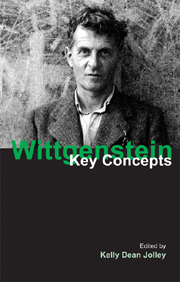Book contents
- Frontmatter
- Contents
- Contributors
- Abbreviations
- Introduction
- 1 Wittgenstein's philosophical remarks
- 2 Wittgenstein on meaning and meaning-blindness
- 3 Language-games and private language
- 4 Wittgenstein on family resemblance
- 5 Ordinary/everyday language
- 6 Wittgenstein on rule-following
- 7 Thinking and understanding
- 8 Psychologism and Philosophical Investigations
- 9 Moore's paradox revisited
- 10 Aspect perception
- 11 Knowing that the standard metre is one metre long
- 12 Therapy
- 13 Criteria
- 14 Grammatical investigations
- 15 Teaching and learning
- 16 Expression and avowal
- Chronology of Wittgenstein's life
- Bibliography
- Index
3 - Language-games and private language
- Frontmatter
- Contents
- Contributors
- Abbreviations
- Introduction
- 1 Wittgenstein's philosophical remarks
- 2 Wittgenstein on meaning and meaning-blindness
- 3 Language-games and private language
- 4 Wittgenstein on family resemblance
- 5 Ordinary/everyday language
- 6 Wittgenstein on rule-following
- 7 Thinking and understanding
- 8 Psychologism and Philosophical Investigations
- 9 Moore's paradox revisited
- 10 Aspect perception
- 11 Knowing that the standard metre is one metre long
- 12 Therapy
- 13 Criteria
- 14 Grammatical investigations
- 15 Teaching and learning
- 16 Expression and avowal
- Chronology of Wittgenstein's life
- Bibliography
- Index
Summary
The Augustinian picture
Wittgenstein's Philosophical Investigations opens with a quotation from Augustine's Confessions. Augustine is giving an account of learning to speak:
When they (my elders) named some object, and accordingly moved towards something, I saw this and I grasped that the thing was called by the sound they uttered when they meant to point it out. Their intention was shown by their bodily movements, as it were the natural language of all peoples; the expression of the face, the play of the eyes, the movement of other parts of the body, and the tone of the voice which expresses our state of mind in seeking, having, rejecting, or avoiding something. Thus, as I heard words repeatedly used in their proper places in various sentences, I gradually learnt to understand what objects they signified; and after I had trained my mouth to form these signs, I used them to express my own desires.
(§1)Of course, Augustine is not recounting from memory, but rather expressing a commonly held view of the way we learn to speak. “This is what must have happened”, he is saying. The central idea here is that the child learns to recognize an object and to associate a word with it.
Now Wittgenstein's intention is to lead us away from this view of learning to speak. The reason he quotes Augustine, who was one of the few philosophers he really admired, was evidently that in his opinion Augustine had given an uncommonly lucid account of this view. Wittgenstein wants us to see that the proposed account does not work.
- Type
- Chapter
- Information
- WittgensteinKey Concepts, pp. 41 - 50Publisher: Acumen PublishingPrint publication year: 2010
- 2
- Cited by

